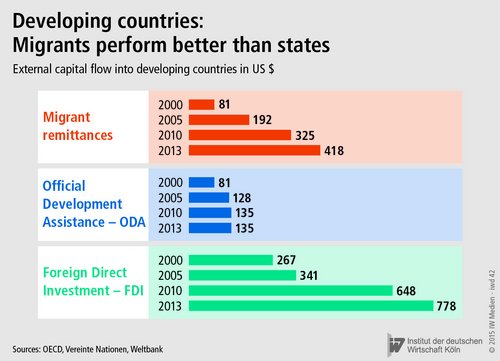Refugees and others migrants who are integrated into the labour market transfer huge amounts of money to their home countries – which outperform even Official Development Assistance (ODA).

The private development aid
Remittances are private money transfers, sent by migrants to help their families or friends in their home countries through International Express Mandate (IEM) services like Western Union or Moneygram.
The sum of these remittances, that are monitored by the World Bank, is quite impressive (see chart):
In 2013 remittance flows to developing countries have reached nearly 413 billion US dollars – five times as much as those of 2000.
This amount appears exceptionally large when compared with the Official Development Assistance: Member countries of the OECD have together spent around 135 billion US dollars in development aid – not even one third of the official remittance flows to developing countries.
Besides foreign direct investment, migrants' private money transfers represent one of the largest financial inflows to developing countries. In some cases, countries have become dependent on remittances, as these amount to a large fraction of their GDP.
In Tajikistan, for example, remittances make up almost half of the country's GDP.
In the recipient countries, those financial resources are mostly used for the daily private consumption. In some places, they are also used to finance health care and education.
In many developing countries, where social welfare systems are often inadequate or lack completely, remittances can be viewed as part of a private welfare system. Remittances improve the living conditions of people and therefore make a major contribution to the reduction of poverty in the world.
More on the topic

Record immigration not only due to flight from Ukraine
In 2022, more people immigrated to Germany than ever before in the history of the Federal Republic. Around 1.46 million more people moved here than left the country, which is more than a quarter more than the previous record of 1.14 million from 2015.
IW
Immigration from Latin America: Successes and potential for securing skilled workers
Against the background of the baby boomers leaving the labour market, Germany will be increasingly dependent on skilled workers from abroad in the coming years in order to secure growth and prosperity.
IW